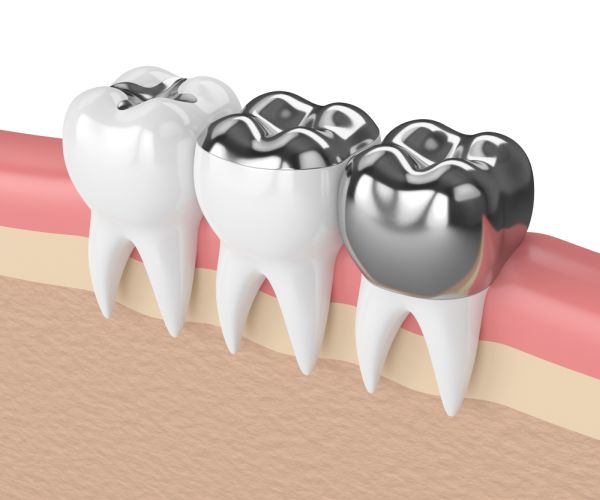Is the Dental Crown Procedure Painful?

People with extensive cavities or other severe damage may often require a dental crown to repair their teeth and restore their smiles. As with most types of dental work, many patients express concern about possible pain and discomfort involved with the procedure. However, this incredibly common technique is typically very easy for both the dentist and the patient, resulting in minimal discomfort throughout the entire process.
Preparing for a dental crown procedure
Individuals who think they may be a candidate for a dental crown should speak with a dentist about the options available to repair the damaged tooth. While most patients will find that this specific approach is an appropriate choice, a dental professional may offer other possible alternatives based on the patient's needs and current condition.
Physical suitability for dental crowns
If a tooth becomes severely damaged due to injury or decay, but the root remains intact, a dental crown can help repair the tooth and restore its beauty and function. Patients who maintain overall good oral health and hygiene can benefit from having a dental crown installed. If the tooth is lost or must be removed, or if decay surrounding the area is too severe, other alternatives such as implants, bridges or dentures may be a more sensible long-term option.
The process of installing a dental crown
A dental crown is a permanent covering that is placed over the surface of the existing damaged tooth. The covering can be made from a variety of materials, including:
- Metal
- Resin
- Porcelain
- Ceramic
A dentist can help guide the patient toward a suitable choice of material based on budget, aesthetic preferences and medical history. During the procedure, the dentist will reshape the damaged tooth to prepare it for the crown. If necessary, decay is removed and the tooth repaired as well. Once the tooth is properly shaped, the dentist takes an impression of the teeth to ensure that the crown fits properly into the patient's mouth. A temporary crown is then fitted into place. Once the final version is complete, the patient returns to have the new crown permanently attached.
Recovering from a dental crown procedure
In general, most patients experience only mild discomfort and some sensitivity after having a dental crown installed. While it is safe to eat and drink relatively soon after the procedure, dentists usually recommend avoiding extremely hot or cold items for a few days, as well as chewy, crunchy or tough foods. Brushing with a sensitivity toothpaste and taking over-the-counter pain medications typically manage most post-procedure pain. If discomfort lingers, it is likely due to the shape of the crown affecting the bite patterns, which can easily be adjusted by a dentist in a matter of minutes.
Conclusion
For a severely damaged tooth, dental crowns are a commonly-used solution to repair the affected area. While some slight discomfort may occur during and immediately after the procedure, pain is usually minimal and very easily managed. Patients who are concerned about undergoing dental work should discuss pain management options with a dental professional.
Request an appointment here: https://www.roswelldentalsmiles.com or call Roswell Dental Smiles at (770) 238-1209 for an appointment in our Roswell office.
Check out what others are saying about our services on Yelp: Read our Yelp reviews.
Recent Posts
Visiting a general dentist on a routine basis is one of the most important things you can do to maintain your oral and overall health. Routine dental visits allow your dentist to identify and treat any oral health issues before they become more intense and expensive problems in the future. This blog will explore the…
Besides ourselves, one other person plays a highly important role in maintaining our oral health, our general dentist. You see, the dentist is responsible for much of the work that goes into our mouths, and without them, most of us would be at a loss as to what to do to protect our teeth, tongue,…
We all try our best to look out for our oral health, but the only way to truly keep up with our oral health is with preventative care provided by a general dentist. Brushing and flossing and oral hygiene are important, but there is so much that a dentist does that accounts for keeping us…
OSA, or obstructive sleep apnea, is a health issue that should receive proper treatment. Your dentist can help you manage this disorder with the proper dental appliance. The oral device will be custom-fit for your needs. Here are the dental appliances that can help with your sleep apnea.This problem involves the blockage of the airways…



